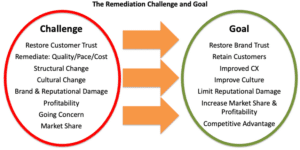By Peter Bertacco, Principal, Oceanic Consulting Group and CEO of Resolve Evolve
In the aftermath of the Banking Royal Commission[1], financial services remediation became a hot topic in Australia. The findings of the Royal commission highlighted significant issues within the industry, leading to calls for reform and compensation for those affected by misconduct.
The fallout from the misconduct identified has been significant, with many customers suffering financial detriment. The financial services industry has responded by implementing a range of measures to address these issues, including improved compliance frameworks, increased transparency around fees and charges, and a greater focus on customer service and customer outcomes.
Four years on from the Royal Commission’s final report recommendations in February 2019, is financial services remediation still as relevant?
On 10th March 2023 the Australian Securities and Investments Commission (ASIC) released Final ASIC update: Compensation for financial advice related misconduct as at 31 December 2022 which highlighted the extent to which “the institutions” have progressed in the financial advice arena after more than eight years of work.
Six of Australia’s largest banking and financial services institutions AMP, ANZ, CBA, Macquarie, NAB and Westpac have made significant progress in addressing the issues identified by the Banking Royal Commission, particularly in terms of compensation for financial advice related misconduct.
The largest institutions combined have paid or offered a total of $4.7 billion in compensation, as at 31 December 2022, to 1.6m customers who suffered loss or detriment because of fees for no servicemisconduct or non-compliant advice including $1.1 billion paid or offered by those institutions between 1 July and 31 December 2022.[2]
ASIC have committed to continue to monitor processes to complete ongoing work in financial advice related misconduct and across other financial services products and services where significant remediation work has been undertaken.
That’s the largest banking and financial services institutions covered. What about other banks and financial services institutions?
Many of the other banks and financial services institutions generally have undertaken the necessary remedial activities required following the Royal Commission. Smaller institutions may not be aware they have any systemic issues.
Remediation and past business reviews are a large part of improving the customer experience of the financial institution and are still very relevant if no such activity has been undertaken. Applying a retrospective lens to the way financial services products and services are sold to customers will always, with hindsight, highlight ways it could have been done better. Remediation activity is no doubt going to be part of the fabric of conducting business in financial services in the future. As the financial services industry continues to evolve, it’s important to review past business practices to ensure that customers have not been disadvantaged. It is essential for rebuilding trust and confidence in the industry.
Benefits of remediation and past business reviews
There are several benefits to conducting financial service remediation and past business reviews, including:
- Rebuilding trust and confidence: Conducting remediation reviews demonstrates to customers that the financial institution takes its responsibility to its clients seriously. By identifying and rectifying past misconduct, institutions can begin to rebuild trust and confidence with customers and regulators.
- Avoiding regulatory scrutiny and legal action: Regulatory bodies are closely monitoring the financial services industry in the wake of the Banking Royal Commission. By proactively identifying and addressing past misconduct, institutions can avoid regulatory scrutiny, potential hefty fines and penalties, operating restrictions or potential termination of licence to operate their business.
- Identifying systemic issues: Conducting remediation reviews can help to identify systemic issues within an institution, which can be addressed. By identifying and addressing the root causes of misconduct, institutions can improve their compliance frameworks and reduce the risk of future misconduct.
- Improving customer outcomes: Remediation reviews can help to identify customers who have been impacted by inappropriate conduct and ensure that they are appropriately compensated leading to improved customer outcomes, greater customer satisfaction and ultimately customer retention. If industry-wide systemic issues are identified, efficient remediation could result in competitive advantage.
- Demonstrating corporate social responsibility: By taking responsibility for past misconduct and compensating those who have been impacted, institutions can demonstrate their commitment to ethical business practices and their role in the wider community.
The benefits of undertaking past business reviews are clear. By identifying and rectifying past misconduct, financial institutions can demonstrate their commitment to putting customers first and rebuilding trust and confidence in the industry, which is essential for its long-term sustainability.

Current regulatory environment
ASIC has taken a strong stance on financial misconduct in the wake of the Royal Commission and is actively monitoring the industry to ensure that standards are being met. ASIC has also implemented measures to address the issues identified in the Royal Commission, including increased penalties for misconduct and greater transparency around the licensing of financial advisers. This means that financial institutions need to be proactive in identifying and addressing past misconduct to avoid regulatory scrutiny and potential legal action.
ASIC have been clear that remediation efforts should be customer centric. On 27 September 2022, ASIC released Regulatory Guide 277[3] (RG 277), replacing its longstanding ancestor RG 256[4]. RG 277 outlines ASIC’s expectations for how all holders of Australian Financial Services Licences (AFSL) and Australian Credit Licences (ACL) should structure policies, processes and procedures for examining compliance failures, misconduct and ultimately to compensate customers, who may have experienced loss or harm as a result.
ASIC outlined nine principals in RG 277, as key considerations that should be adopted by licensees, to achieve fair and timely outcomes for customers. The main objective being to restore affected customers as closely as possible to the position they would have been in had the misconduct or other failure not occurred. Refer to SIAA Monthly February 2023 where we have covered this in more detail in the article RG 277: Practical considerations for stockbroking firms.
In addition to regulatory pressure, there is also growing public scrutiny around the conduct of financial institutions. Customers are increasingly aware of their rights and are more likely to take legal action if they feel that they have been treated unfairly. The role of the Australia Financial Complaints Authority (AFCA) has been instrumental in acting as an external dispute resolution scheme for consumers who are unable to resolve complaints with member financial services organisations.
Financial services remediation is still relevant because it’s the right thing to do. Customers who have been impacted by inappropriate conduct deserve to be compensated, and financial institutions have a responsibility to rectify past mistakes. This process of remediation is essential for rebuilding trust and confidence in the industry, and for ensuring that customers are treated fairly in the future.
Takeaways for leaders and risk professionals in stockbroking
From the many remediation reviews we have conducted within the financial advice industry the issues we identify most often are:
- Evidence that service has been provided to a customer is not appropriately documented or stored, leading to the licensee being unable to prove it provided the service it charged for.
- Complex ongoing service arrangements are not appropriately monitored and supervised, and are ultimately not met by advisers.
- Based on the customers’ risk profile and appropriate asset allocation the advice provided was inappropriate and not in the best interests of the customer
In stockbroking, client engagement agreements will take many different formats promising varying levels of services for the fees charged. Taking a customer-centric view, stockbroking firms should consider a regular past business review as a “health check” to ensure they are providing the very best service they can for their clients and that they are meeting those promises. In the case of the financial advice industry there are benefits of a sampling based “health check” or due diligence review which includes potentially reducing the rising costs of professional indemnity insurance premiums and, where consolidation of advice businesses is taking place across the industry, the value of the business can be maximised in the event a prospective purchaser has concerns about legacy issues within the book of business.
Finally, evidencing service to clients is paramount. Document the services being provided and the rationale behind the advice given and any actions taken for your clients. There are constantly new innovations and technology solutions that can support your monitoring and supervision framework, avoiding issues before they occur. The industry will no doubt be better for it and so will your customers.
OCG is a professional services firm that delivers value through deep subject matter and industry expertise, formed with the desire to change the management consulting landscape. Our principals have technical expertise, backed by decades of experience, leading firms in markets, wealth management and banking, in Australia, Europe, Asia and the US.
Resolve Evolve are subject matter experts in financial services remediation and has developed RemedioUX, an innovative case management and workflow tool, that has been designed to easily configure and support any remediation or compliance review.
OCG will be delivering a SIAA webinar addressing RG277 issues on 26 April 2023 https://www.stockbrokers.org.au/education/cpd-webinars.
[1] The Royal Commission into Misconduct in the Banking, Superannuation and Financial Services Industry in Australia (the “Banking Royal Commission”) issued the interim report in September 2018 and the final report in February 2019.
[2] 23-057MR Final ASIC update: Compensation for financial advice related misconduct as at 31 December 2022, issued 10th March 2023. https://asic.gov.au/about-asic/news-centre/find-a-media-release/2023-releases/23-057mr-final-asic-update-compensation-for-financial-advice-related-misconduct-as-at-31-december-2022/
[3] ASIC Regulatory Guide 277: RG 277 Consumer remediation, Issued 27 September 2022. https://asic.gov.au/regulatory-resources/find-a-document/regulatory-guides/rg-277-consumer-remediation/
[4] ASIC Regulatory Guide 256: RG 256 Client review and remediation conducted by advice licensees, Issued 15 September 2016. https://asic.gov.au/regulatory-resources/find-a-document/regulatory-guides/rg-256-client-review-and-remediation-conducted-by-advice-licensees/


